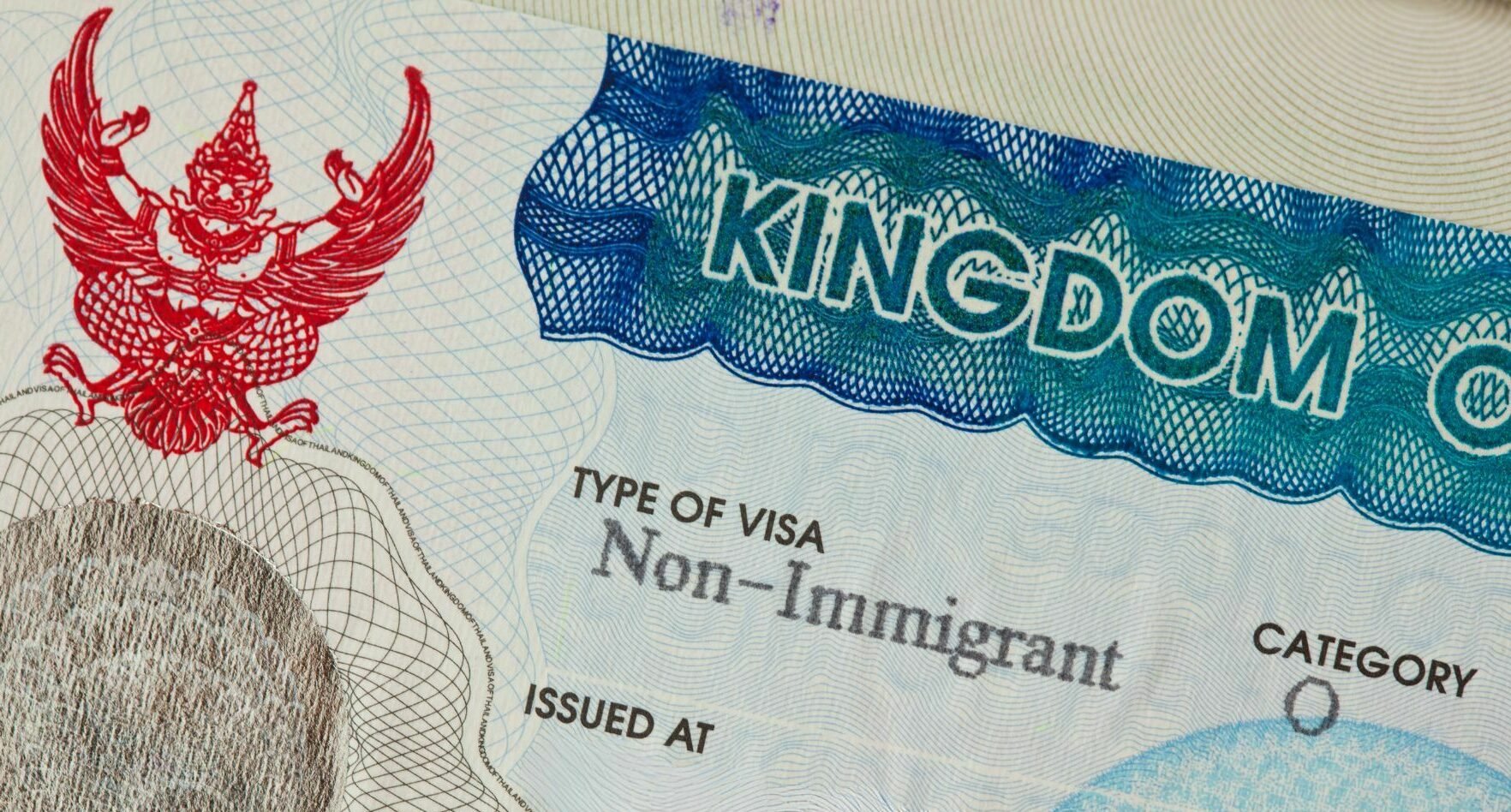Retiring in Thailand for British citizens

Retiring in Thailand is a popular choice among many UK citizens because of its vibrant culture and affordable lifestyle. It’s the perfect mix of tradition and modern life, which makes it an awesome spot for anyone to enjoy retirement. While moving abroad might feel a bit much, having the right information can make the whole process a lot easier. Here are some important things you need to know so you can settle into your home in Thailand with no worries!
Retiring in Thailand

Can Brits retire in Thailand?
Yes, Brits can retire in Thailand. Many expats find the cost of living lower than in the UK, making it an attractive place for retirement. The Thai government offers a retirement visa called the Non-Immigrant O-A and O-X visa. These visas allow you to retire in Thailand, provided they meet the qualifications.
Visas and residency

Retiring in Thailand involves understanding the visa options and residency requirements. You must choose the right visa that suits your plans.
How to obtain a retirement visa in Thailand
The O-A visa is valid for one year, while the O-X visa allows you to stay in Thailand for 10 years. If you aim for any of these visas, you may apply the qualifications below:
| Criteria | Non-Immigrant O-X Visa | Non-Immigrant O-A Visa |
|---|---|---|
| Age requirement | 50 years or older | |
| Financial requirements | – Bank deposit of at least 3,000,000 Thai baht – OR a deposit of at least 1,800,000 Thai baht plus a monthly income of at least 1,200,000 Thai baht per year | – Monthly income of at least 65,000 Thai baht – OR a bank deposit of at least 800,000 Thai baht |
| Bank account requirement | Must maintain funds for at least 1 year | Must maintain funds for visa duration |
| Medical certificate | Required, showing no prohibitive diseases | |
| Health insurance | Coverage of at least 40,000 Thai baht (outpatient) and 400,000 Thai baht (inpatient) | |
| Criminal record certificate | Required from country of nationality and permanent residence | Not specifically required |
| Duration of stay | Up to 10 years | 1 year (renew annually) |
Another choice, is the Long Term Residents (LTR) visa, valid for 10 years, if you meet specific financial needs. You need an annual pension or steady passive income of at least $80,000 (around 2.88 million Thai baht).
How to apply for permanent residency in Thailand
Applying for permanent residency in Thailand involves several steps. You can start the process after living in Thailand for three consecutive years with a retirement visa. Gather documents such as your passport, financial statements, and proof of income. Submit your application to the Immigration Bureau. If you get approved, you can enjoy long-term residency without the hassle of renewing your visa every year. But keep in mind that this process might take some time, so patience is essential.
Eligibitiy
- Age requirement: You must be at least 50 years old or over.
- Visa status: You need to hold a valid non-immigrant visa, such as a retirement visa or a non-immigrant O or OA visa.
- Financial requirements: You must meet one of the following financial criteria:
- A security deposit of 800,000 Thai baht in a Thai bank account for at least two months prior to application.
- A monthly income of at least 65,000 Thai baht.
- A combination of both: a monthly income of 65,000 Thai baht and a security deposit of 800,000 Thai baht.
- Proof of residence: You need to provide documentation proving your residence in Thailand, such as a rental agreement or utility bills.
Other things to consider when retiring in Thailand are the cost of living, taxes, property, and communities.
Cost of living

If you’re a UK citizen and are planning to retire in Thailand, it involves understanding your financial requirements. Understanding these financial aspects helps you prepare adequately for retirement in Thailand. Since the living costs here are significantly lower than in the UK, your funds stretch further. For instance, the general cost of living is about 60% cheaper for rent and 30% cheaper for groceries. This makes retiring in Thailand appealing, as you can maintain a good lifestyle without overspending.
How much money do you need to retire to Thailand from the UK?
You need a stable income or substantial savings for a comfortable retirement in Thailand. For the Non-Immigrant O-A visa, which is popular among UK citizens, you require either a monthly income of 65,000 Thai baht (approximately £1,650) or a savings balance of at least 800,000 Thai baht (approximately £20,000). If opting for the O-X visa, you can secure a ten-year residency. This option includes a requirement for a 3,000,000 Thai baht deposit in a Thai bank or an annual income of 1,200,000 Thai baht.
Here’s an overview of the cost of living for a month that you can expect if you want to live here:
| Category | Estimated Cost (Thai baht) |
|---|---|
| Housing | 15,000 to 80,000 |
| Utilities | 3,000 to 5,000 |
| Food | 6,000 to 20,000+ |
| Transportation | 2,000 to 10,000 |
| Healthcare | 5,800 to 14,000+ |
| Entertainment | 2,000 to 10,000 |
| Total | 33,800 to 139,000+ |
For a comfy retirement in Thailand, you’re looking at around 33,800 Thai baht to 139,000 Thai baht a month, depending on how you like to live. If you want a more comfortable lifestyle, it’s a good idea to budget between 50,000 Thai baht and 100,000 Thai baht per month.
Tax and pension

Understanding tax and pension matters is essential as you plan to retire in Thailand. Here’s some important information specifically for UK citizens.
Does Thailand tax expats?
Thailand does not impose tax on your income earned in the UK if you live in Thailand. You remain liable for UK taxes as a British citizen. Since Thailand and the UK have a double taxation agreement, you will not pay tax in both places on the same income. If your income comes from sources within Thailand, that may attract local taxes.
Can I get my UK state pension in Thailand?
Yes, you can claim your UK State Pension while living in Thailand. You need to contact the International Pension Centre to begin receiving your payments. They facilitate the process for you, ensuring that your state pension reaches you without issues.
Do I pay tax on my UK pension in Thailand?
No tax applies to your UK pension when you receive it in Thailand. The UK taxes your pension before it is withdrawn, so you do not face additional taxes in Thailand. This policy allows you to keep the full amount of your pension for living in Thailand.
Can I transfer my UK pension to Thailand?
Yes, transferring your UK pension to Thailand is possible through a Qualifying Recognised Overseas Pension Scheme (QROPS). However, this option carries a 25% overseas transfer charge. Be cautious and consult with a financial adviser before proceeding with a transfer.
Focusing on these key points makes it much easier to manage your pension and taxes when retiring in Thailand. With this information, you’ll be set for a more secure financial future in your new home.
Property and housing

Where do most British expats live in Thailand?
Most British expats tend to settle in lively cities that offer a mix of comfort and tradition. Bangkok, Phuket, and Chiang Mai stand out as popular choices for those looking to retire in Thailand. Each city provides unique experiences along with essential amenities.
Which part of Thailand is best for retirement?
The best part of Thailand for retirement largely depends on your lifestyle preferences. Chiang Mai frequently tops the list due to its low cost of living and rich cultural traditions. This city offers a relaxed atmosphere alongside good healthcare facilities and a strong expat community. Phuket appeals to beach lovers with its stunning coastline and busy nightlife, making it perfect for those who desire a more active retirement. Bangkok offers urban conveniences and entertainment options, ideal for retirees who appreciate an exciting city life.
Where is the cheapest place to retire in Thailand?
You will find that smaller towns and areas like Chiang Mai and Koh Samui are often the cheapest places to retire in Thailand. In these regions, rent can be over 60% cheaper compared to similar accommodations in the UK. Groceries also cost around 30% less. By choosing these locales, you enjoy a comfortable lifestyle without overspending.
Can a UK citizen buy a house in Thailand?
As a UK citizen, you can buy a house in Thailand but with specific restrictions. Foreigners can own condos no more than 49% of the condominium units owned by non-Thais. When it comes to land, you may not own it directly but can opt for a long-term lease. Additionally, forming a Thai company for purchasing land is another option worth exploring. Before making any commitments, seek legal advice to guide this process smoothly and avoid pitfalls.
How much does a retirement home cost in Thailand?
Retirement home prices in Thailand vary significantly based on the location and amenities. On average, you can expect to pay between 10,000 to 35,000 Thai baht (approximately £250 to £875) monthly for a one-bedroom apartment. Luxurious options are available at higher rates in cities like Bangkok and Phuket. Always assess what fits your budget while ensuring safety and comfort. If you’re interested in living one, these are the 5 best retirement homes to spend your golden years.
Healthcare in Thailand

Healthcare offers you excellent options when you retire in Thailand. Thailand is known for its high healthcare standards with many quality hospitals and clinics, specifically in cities like Bangkok, Phuket, and Chiang Mai. Many international patients choose Thailand for medical treatments due to lower costs and high-quality care. With many services available, you can find both public and private healthcare that suits your condition and interest.
Private health insurance serves you well. You can access the best medical care when you have thorough coverage. Costs vary based on your age and any pre-existing conditions. Make sure to compare different insurance providers to find a plan that fits your needs. British citizens often praise private hospitals for their modern facilities and English-speaking staff, making communication easier.
Public healthcare provides an affordable alternative. Citizens and legal residents can access this service. Public hospitals may have longer wait times compared to private facilities, but they deliver essential services at lower costs.
Need some help getting health insurance in Thailand? Don’t worry! Check out our Thaiger’s Health Insurance page to get the most reliable, high-quality health insurance with extensive coverage.
Money and banking

Managing finances while you retire in Thailand involves understanding banking options and handling your money wisely. Keeping a UK bank account open simplifies your financial situation, as it makes it easier to receive pension payments and manage expenses back home.
Can I have a UK bank account if I live in Thailand?
Yes, you can maintain a UK bank account even if you live in Thailand. It is advisable to keep your UK bank account active while living abroad, as many pension providers find it challenging to pay into overseas accounts. Some banks, like HSBC, offer expat accounts specifically designed for UK citizens. These expat accounts provide benefits such as online banking and international transfers, making it easier to manage your finances across countries.
To keep your UK bank account, ensure you meet any bank requirements to avoid account closure. Simple practices like keeping a minimum balance or using the account for transactions help maintain your account. Stay updated on any changes to your bank’s policies regarding overseas residents.
Local bank
Managing finances in Thailand also includes understanding local banking options. Consider opening a Thai bank account for local transactions, as this can make daily spending convenient. You typically need your passport, a visa, and proof of address to open a Thai bank account. Research banks that cater to expats for better service and support.
Recommended Thai banks for UK expats
- Bangkok Bank: One of Thailand’s largest banks, it offers a wide range of services and has a strong international presence.
- Kasikorn Bank (KBank): Known for its expat-friendly services and multilingual support.
- Siam Commercial Bank (SCB): One of Thailand’s oldest banks, SCB provides comprehensive banking services.
- Krungsri Bank (Bank of Ayudhya): Offers strong digital banking services and is well-regarded for international transfers.
- TTB Bank (formerly TMB Bank): Known for its competitive rates and customer service.
By having both your UK and Thai bank accounts, you can keep your finances smooth and stress-free, making it easy to access your money and handle payments while enjoying retirement in Thailand.
Births, deaths, marriage and civil partnership

Understanding the legal procedures related to births, deaths, marriages, and civil partnerships in Thailand is essential for UK citizens who plan to retire in Thailand. These matters can differ significantly from the UK, so knowing the local regulations ensures a smooth transition and helps manage any unexpected situations.
Births
When having a baby in Thailand, you must register the birth with the local district office within 15 days. You need to provide a completed birth registration shape, a passport, and a marriage certificate if applicable. Obtain the birth certificate in both Thai and English, as it assists in obtaining the baby’s passport. Hospitals usually assist with this process, ensuring you have all the right documents.
Deaths
In the unfortunate event of a death occurring in Thailand, specific steps must be followed. First, contact the local authorities to handle the situation. Then, notify the relevant embassy or consulate, as they can provide assistance and guidance for UK citizens. A local death certificate must be obtained, which is necessary for any further processes, including repatriation if desired.
Marriage and civil partnership
To marry in Thailand as a UK citizen, you need to gather required documents, including a valid passport and a “certificate of freedom to marry” from the British Embassy. This document verifies your legal ability to marry and is essential for the marriage registration process in Thailand. Register your marriage within 90 days of the ceremony at the local amphur office. You may also want to engage legal advice to ensure you guide the local laws efficiently.
For civil partnerships, similar documentation is required. It’s wise to consult local authorities if you are unsure about specific legal requirements, as regulations may change. Being well-prepared ensures a smooth marriage or civil partnership experience in Thailand.
Frequently asked questions (FAQs)
Can a British citizen live in Thailand?
Yes, British citizens can live in Thailand. The country is known for its friendly atmosphere and welcoming locals. Many expats find the cost of living lower than in the UK, making it an attractive place for retirement. Popular destinations such as Chiang Mai, Phuket, and Hua Hin offer a mix of lively and serene environments. Each city has its charm, from busy markets to quiet beaches.
How long can Brits live in Thailand from the UK?
British citizens can live in Thailand for up to a year on a retirement visa. This visa is renewable annually, providing flexibility. With proper paperwork, your stay can be extended significantly. Plus, the LTR visa offers a feasible way to live in Thailand for ten years if you meet the financial conditions.
How hard is it to move to Thailand from the UK?
Moving to Thailand from the UK is manageable with the right preparation. Start by gathering essential documents like your passport, bank statements, and proof of income. Understanding the retirement visa requirements is crucial for a smooth transition. You might face some language barriers initially; however, many locals speak basic English, specifically in tourist areas. Adjusting to the tradition may take time, but a welcoming community of expats can help you settle in and feel at home.
What happens if a UK citizen dies in Thailand?
If a UK citizen dies in Thailand, the family must inform the British Embassy as soon as possible. The embassy can help plan the repatriation of the deceased’s body back to the UK and assist with paperwork. Be prepared for costs associated with this process, such as embalmment and transportation fees. Consider discussing funeral plans with your family and understanding your preferences ahead of time can ease decision-making in difficult times.
Can I claim UK benefits in Thailand?
Yes, you can claim your UK State Pension while living in Thailand. To ensure you receive your payments without issues, contact the International Pension Centre for detailed guidance. While residing in Thailand, you continue to qualify for your UK benefits, providing financial security during retirement.
How do I become a resident of Thailand?
To become a resident, you typically need to apply for a long-term visa (such as a retirement or work visa) and meet specific residency requirements, including financial stability and legal status.
What is the new tax law in Thailand 2024?
As of now, specific details about tax changes for 2024 have not been widely publicised. It is advisable to consult the Thai Revenue Department or a tax professional for the latest updates.
































